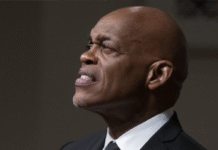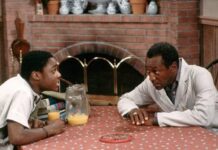

The HBO docudrama All the Way chronicles Lyndon Baines Johnson’s first year as President of the United States following the assassination of John F. Kennedy on Nov. 22, 1963. Breaking Bad’s Emmy-winning actor Bryan Cranston reprises his idiosyncratic, Tony Award-winning performance as the 36th President seeking reelection and concurrently striving to legislate the Civil Rights Act of 1964 with the alliance of Dr. Martin Luther King, Jr., portrayed by actor Anthony Mackie.
All the Way, which took home another Tony Award for Best Play in 2014, was penned by Pulitzer Prize-winning dramatist Robert Schenkkan. Writing the HBO teleplay also, Schenkkan’s re-imagination included more of LBJ’s interactions with MLK, Vice President Hubert Humphrey (Bradley Whitford), Senator Richard Russell, Jr. (Frank Langella) and J. Edgar Hoover (Stephen Root) than the stage version.
Schenkkan, who came-of-age in Austin, TX, shared some insights prior to All the Way’s advanced screening at The Carter Center two days prior to the network television premiere about the time and financial constraints he worked under to secure the film. The pithy, Drama Desk Award-winning dramaturge segued immediately into explaining the inspiration behind constructing the period piece.
“[LBJ] was always in my head as this phenomenal, such fascinating character,” says an epigrammatic Schenkkan, whose father, a Southwestern public television and radio pioneer, had interactions with LBJ. “It was a turning point in this country. LBJ changed everything. It’s important to revisit that story, particularly now.” All the Way is the second film project the University of Texas at Austin and Cornell University graduate executive produced along with Academy Award-winning director Steven Spielberg.
The first film they worked on together was HBO’s war-themed miniseries The Pacific. “He had a great casting eye,” continues the terse Kennedy Prize for Drama recipient gripping his wrist. “He’s got a lot of things going on, but when he’s focused on you, he’s really really focused.”
All the Way’s director Jay Roach magnificently recreated intimate portraits into LBJ’s circle, weaving together in two-plus hours a myriad of close-ups, creeping cinematography sequences, archival footage and vintage stock photos. Coming into the fold after previously directing the Austin Powers series, Meet the Fockers and Meet the Parents, Roach originally caught All the Way on Broadway, leaving Neil Simon Theatre in amazement.
An alumnus of Stanford and USC School of Cinema-Television (now Cinematic Arts), Roach is synonymous with brilliantly meshing together drama with absurdity. The Albuquerque, NM native willingly accepted an offer to direct All the Way’s television adaptation after Spielberg personally contacted him. “I’m always trying to slip in a little thematic something, and that requires a new expressionistic cinematic style,” adds the relaxed filmmaker.
“Every choice comes out of what the character is going through. I wanted to go past the history into what mattered to LBJ and MLK, what really bothers these guys and what prevented them from fulfilling their greatest possible destiny.” Familiar with directing small screen projects for HBO centered around political campaigns like Recount and Game Change, Roach, an Emmy, Golden Globe and Peabody Award-winning filmmaker, directed Cranston in the Oscar-nominated feature Trumbo. He readily pinpointed his appreciation especially for Cranston’s captivating, natural ability to balance comic relief with dramatic acting.
Periodically staring towards the floor, Roach had similar perspectives on Mackie’s acting ability, equally calling him “one of the funniest guys he’s hung out with between takes.” “There’s not much humor in this particular story, but you still get a sense that the actors understand wit and irony,” continues Roach, also an executive producer on All the Way.
All the Way’s racially motivated montages like the murder of the three young civil rights workers in Philadelphia, MS, Dave Dennis’ anger-filled soliloquy during James Chaney’s funeral and Fannie Lou Hamer explaining the brutality she faced resulting from registering voters struck a chord with both Roach and Schenkkan. LBJ’s plight to retain his presidency over opponent Barry Goldwater while working to keep peace among Southern Democrats additionally left serious impressions on both the filmmaker and scenarist.
Roach declared that the tensions LBJ and MLK both faced throughout All the Way magnified how both leaders were essentially fighting the same battle, collaborating, compromising and cooperating with both of their respective supporters. “They were allies,” proclaims Roach. “They had to answer to their different factions. They’re both in the same predicament and are both absolutely trying to go for the same thing.”
Schenkkan chimed in. “Storytelling is a very powerful tool,” he says. “Stories define and shape us. That’s how we make sense of the world. That can also be used to betray us, plow and hide things. Telling a story is a political action because you’re reclaiming the narrative. To do so on film amplifies that power.”
Coming to Broadway in the 2017-18 season is All the Way’s sequel, The Great Society. The play spans from November 1964 to March 1968, extending LBJ and MLK’s ongoing dialogue and details about both the Vietnam War and Civil Rights Movement. Deeming All the Way a career highlight, Schenkkan clarified about how completing both projects heightened his awareness of American politics and society.
“It’s made me even more keenly aware of the importance of government,” confirms Schenkkan. “Government can do good. That’s what it’s intended to do. When people really put their shoulders to the wheel, you can make a huge difference in people’s lives.”
Roach, on the other hand, gathered his inspiration from the sense of camaraderie among the unsung civil rights icons. He drew parallels between the past and race relations in contemporary society.
“It opened my brain in such a phenomenal and fundamental way,” the filmmaker reveals. “So much of what really mattered was going on at the grassroots level. That’s what’s happening today. Movements like #BlackLivesMatter are out of passion and a community of people that wants better. It’s really phenomenal to see people believe that government can really solve a problem. Unfortunately, those are battles that still need to be fought.”
All the Way premiered on May 21 on HBO. Check local listings for future air dates and times.
This post was written by Christopher A. Daniel, pop cultural critic and music editor for The Burton Wire. He is also a contributing writer for Urban Lux Magazine and Blues & Soul Magazine. Follow Christopher @Journalistorian on Twitter.
Like The Burton Wire on Facebook. Follow us on Twitter @TheBurtonWire.








